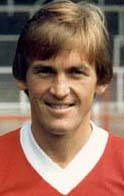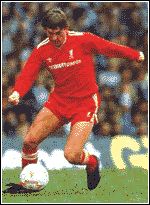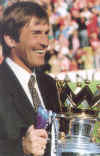|
Kenneth
Mathieson Dalglish MBE
|
|
1951: born in Dalmarnock,
Glasgow's east-end, on 4 March.
Dalglish grew up supporting Glasgow Rangers. Born in Dalmarnock in
the East End of Glasgow on March 4, 1951. He moved to
Milton in the north
of Glasgow in 1952 and (at the age of 1), along with his mum, dad and
elder sister Carol stayed there for around fourteen years. He went to Miltonbank School then High Possil Senior Secondary. From the moment he
could walk he was kicking a football. He played for High Possil School
Football team. The family moved to Govan around 1966 as his dad was a
Rangers fan and they moved there to be nearer Ibrox in the hope that
Kenny would play for Rangers one day.
1966: Played for Scotland schoolboys.
He first made his mark at Miltonbank primary school - in goal! But by the
time he was capped as an under-15 Scottish Schoolboy he had switched to
right-half, scoring twice on his debut in a 4-3 victory over Northern
Ireland Schoolboys.
His next schoolboy international appearance was in a 1-1 draw against
England. The People newspaper covered the game, singling him out for praise
as "a brilliant ball-player." There was never any doubt that he
was going to be a professional footballer. The question was for whom?
He wanted to join his idols at Rangers. He had
a trial at West Ham, but that came to nothing. And so it was that Dalglish,
the son of an engineer, found himself playing for Glasgow Celtic and Jock
Stein.
|
|
CELTIC
|
1969: First team debut for Celtic (324 games, 167 goals).
1971: Won first of 102 Scotland caps (8 as sub), scoring 30 goals
Honours with Celtic.
Six Scottish Championships 1969-1970,
1970-1971, 1971-1972, 1972-1973, 1973-1974, 1976-1977
Two Scottish Cup : 1969-70, 1974-75
|
1967: Joined Celtic on provisional contract.
Kenny Dalglish played for Drumchapel Amateurs and Glasgow United before Vic
Davidson's mother recommended him to Sean Fallon, caretaker manager of
Celtic, in 1967.
His signing, on a provisional contract in July 1967, was not without
amusement. Jock Stein, the legendary Celtic manager, had sent his assistant
Sean Fallon to see Dalglish and his parents at their home.
Fallon drove there and left his wife Myra and their three children outside
in the car while he went in, saying he wouldn't be long. It was three hours
before Fallon emerged with Dalglish's signature and his wife was less than
pleased. It wasn't just that the kids were hungry and restless after being
couped up. It was the couple's wedding anniversary.
1968: Turned professional; loaned by Celtic to Cumbernauld United.
Dalglish was farmed out to a Celtic nursery side, Cumbernauld United, and he
also worked as an apprentice joiner. By the following year he had turned
professional and was a regular member of a Celtic reserve team so good it
was known as the Quality Street Gang.
1969: First team debut for Celtic (324 games, 167 goals).
It took Dalglish three years to establish himself in the first team. At that
time Celtic were not only top dogs in Glasgow, they had become the first
British team to win the European Cup, beating the mighty Inter Milan.
Stein took a great interest in the lad, recognising his potentially
outstanding talent. Eventually he gave him his chance in a benefit match.
The result was Celtic 7 Kilmarnock 2. Nothing unusual about that - except
that Dalglish scored six!
1971: Won first of 102 Scotland caps (8 as sub), scoring 30 goals.
Was also the year that Dalglish witnessed the first of three tragedies
which, ultimately, were to leave such a mark that he quit the game. It was
the "Old Firm" match at Ibrox. Dalglish was not playing but was at
the ground with the Celtic team. Stairway 13 at the old stadium collapsed
and 66 fans were killed
1972-73 Dalglish, now playing up front, was Celtic's leading marksman
with a seasonal tally of 41 goals in all competitions. And that Dalglish
trademark of shielding the ball with his back to the goal had emerged.
1975-76 Dalglish was made Celtic captain but it was a miserable year.
Stein was badly hurt in a car crash and missed most of the season. Celtic
failed to win a trophy for the first time in 12 years.
1976-77 The next season Stein was back and Celtic did the Cup and
League double. Dalglish, however, had made up his mind to leave. Celtic had
won the European Cup before he had arrived at the club and Dalglish wanted
the chance not just to savour European football, but to be where there was a
real chance of success.
"I had to know if I could make it somewhere else," he
explained. "I did not want to go through the rest of my life wondering
what might have been without putting myself to the test."
Dalglish had enjoyed an enviable run at Celtic. Five Scottish
Championships, four Scottish Cup-winners' medals, one Scottish League
Cup-winners' medal and a tally of 167 goals. But it wasn't enough for him.
He was ambitious and needed a new challenge.
|
|
.
|
|
LIVERPOOL
|
|
 1977:
Transferred to Liverpool for record transfer fee of £440,000 on the
11th of August. 1977:
Transferred to Liverpool for record transfer fee of £440,000 on the
11th of August.
Debut :
13th August 1977 v Manchester United (N) Charity Shield: Drew
0-0
1st team games:
511
1st team goals:
172
International caps while with Liverpool:
54
Honours with Liverpool:
First Division Championship: 1978/79, 1979/80, 1981/82, 1982/83,
1983/84, 1985/86 (player/manager), 1987/88 (player/manager) &
1989/90 (player/manager), FA Cup 1986 (player/manager), 1989
(manager), Charity Shield 1977 (shared), 1979, 1980, 1982, 1986
(shared), European Super Cup 1977, European Cup 1977-78, 1980-81,
1983-1984, Screen Sport Super Cup 1986 (player/manager)
|
|
1977: first season
was a triumph for Dalglish. He scored 30 goals, including the only
goal of the game as Liverpool retained the European Cup against Bruges
at Wembley. Dalglish had left Scotland looking for European glory and
had found it inside one year.
1979: Footballer of the Year.
1983: Footballer of the Year and Players' Player of the
Year. |
|
|

|
Being
presented with the
Football Writers' Footballer of the Year
Award in 1983 by Pele |
|
1985:
Appointed manager of Liverpool in wake of Heysel tragedy.
1986: Leads Liverpool to League and FA Cup double in his first season.
1988: Wins League title, but lose to Wimbledon in FA Cup final upset.
1989: Attends many of the funerals of the victims of the Hillsborough
disaster. Liverpool beat Everton 3-2 after extra time to win FA Cup,
but lose title to Arsenal after dramatic final match at Anfield.
1990: Wins his third League title with Liverpool.
1991: Announces shock resignation in February, saying he cannot cope
with the pressure |
|
Considered
by many to be the greatest player in Liverpool history Dalglish
gloriously displayed that priceless quality of performing as a
brilliant individual within a team framework. "His genius is not
only in his own ability but in making others play", proclaimed
Bob Paisley, the manager who signed him from Celtic for £440,000 in
August 1977.
With Kevin Keegan having departed to Hamburg for £500,000 earlier
that summer the capture of Dalglish as his replacement must rank as
one of football's shrewdest pieces of business as the Glaswegian who
amassed a record 102 caps and joint record 30 Scotland goals inspired
the club to new heights.
 'King Kenny'
swiftly became a Kop hero and his late partnership with Ian Rush was
perhaps the finest ever seen in England. 'King Kenny'
swiftly became a Kop hero and his late partnership with Ian Rush was
perhaps the finest ever seen in England.
Such was Dalglish's skill at holding on to the ball that, years later,
the former Arsenal and Republic of Ireland defender David O'Leary
would describe trying to rob him of possession as "impossible.""He
crouches over the ball, legs spread and elbows poking out," said
O'Leary. "Whatever angle you come in from, you're liable to find
his backside in your face."
Dalglish's majestic play was blessed with a creative vision and icy
coolness only the true legends of the game possess. His 1978 European
Cup winning goal against Bruges at Wembley - one of 172 he scored for
the club in more than 500 appearances - was a supreme example of how
he could 'freeze' play before delivering a deadly finish.
With Ray Clemence, Alan Hansen, Graeme Souness and Billy Liddell he
was voted into the BBC Merseyside Team of the 20th Century and he is
an MBE.
If Kenny Dalglish had simply played football for Liverpool he would
be an Anfield hero. However, the fact that he managed the club to even
greater success guarantees him the status of a legend.
After eight brilliant years as a player he was asked in 1985 to
combine his work on and off the pitch to become Liverpool¹s first
player / manager. It was an inspired choice. In the space of five
years he was voted 'Manager of the Year' three times and led Liverpool
to a League and FA Cup double in 1986 and further championships in
1988 and 1990.
He was responsible for signing some fine players including John
Barnes, Peter Beardsley and a young Jamie Redknapp. One of his great
moves was to make the brilliant defender Alan Hansen his captain - a
move applauded by all but the painfully shy Hansen. Alan however
rewarded Dalglish's faith and turned in some of his finest
performances under Kenny.
When it came to transfers, the purchase of John Aldridge to replace
the surely irreplaceable Ian Rush equalled that of Paisley buying
Dalglish to replace Keegan. The terrible, shattering events at
Hillsborough on April 15th 1989, spelt the end of Dalglish's time with
the club, and indeed for a time, with football. Dalglish and his squad
spent countless hours trying to find ways to bring comfort to the
bereaved and traumatised, but eventually if proved too much for this
sensitive man. He suddenly resigned in 1991, after admitting that the
strain and emotional distress of the Hillsborough tragedy had made him
feel like his 'head would explode'.
The effect on Merseyside was only equalled by the similarly surprise
retirement of Bill Shankly. Whilst few would dispute his reasons,
there was dismay that one of the great periods in the Club's history
was closing: For the fans player/manager Dalglish had taken them on a
wonderful, joyous ride through the League and the passion he
engendered was equalled only by Shankly. |
|
|
BLACKBURN
|
1991: Appointed Blackburn manager in October.
- Appointed manager of Second Division Blackburn Rovers hours before
their home game at Ewood Park against Plymouth Argyle on Saturday, 12
October 1991. Rovers win 5-2.
- Appoints Ray Harford as his assistant.
- The Lancashire club climb the table and a 1-0 Wembley win over
Leicester City in the Second Division play-off final in May takes
Blackburn back into the top flight for the first time since 1966 and in
time for the launch of the new Premier League.
- 1992 Breaks British transfer record in July by paying £3.3million to
Southampton for Alan Shearer.
- 1994 Breaks transfer record for second time by paying £5million to
Norwich for Chris Sutton in July.
- 1995 Steers Blackburn to first championship for 81 years. Becomes
Blackburn's director of football, with assistant Ray Harford taking over
as manager.
 This managerial
successes proved his time at Anfield had been no fluke as he joined the
select This managerial
successes proved his time at Anfield had been no fluke as he joined the
select
band of men to have taken two clubs to the championship title.
winning the Premier League
with Blackburn, at Anfield
Leaves Blackburn by mutual consent.
In December 1996 he was appointed as business development manager for
Rangers, chairman David Murray's company Carnegie Sports International.
.
|
| NEWCASTLE
|
 1997:
Succeeds Kevin Keegan as manager of Newcastle in January. 1997:
Succeeds Kevin Keegan as manager of Newcastle in January.
1998: A most disappointing season sees Newcastle end in a frustrating
13th place in the league.
A good FA Cup run ends at Wembley when they lose to Arsenal.
1998: Sacked from Newcastle United after only 2 games played in the
new season. A strange time to change manager according to many..
Dalglish took legal action concerning his dismissal, eventually
winning compensation from the board.
.
|
|
CELTIC
|
| 1999 In June, Dalglish becomes "Director of
Football" at Celtic. Appoints former Liverpool team-mate John Barnes
as club manager
1999-2000
|
|
|
| SCOTLAND
|
1971 Won first of 102 Scotland caps (8 as sub),
scoring 30 goals.
He had been a full Scotland international for six years, making his debut
as a substitute in the 1-0 victory over Belgium in November 1971. He went
to the 1974 World Cup in West Germany, but did not play well. Scotland
were eliminated at the group stage, even though they were undefeated.
That spring of 1977 he had scored in Scotland's 2-1 victory over England
at Wembley when the Tartan fans invaded the pitch and tore down the
goalposts.
|
.
|